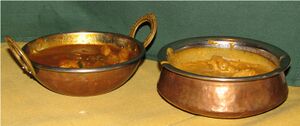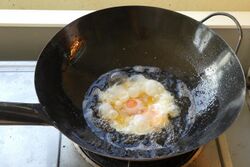Engineering:Karahi
A karahi (/kəˈraɪ/; Assamese: কেৰাহী, romanized: kerahi, Bengali: কড়াই, romanized: koṛāi, Hindi: कड़ाही, romanized: kaṛāhī, Marathi: कढई, Nepali: करै, Urdu: کڑاہی, Persian: کرہ also kadai, kerahi, karai, kadhi, kadahi, kadhai sarai, or cheena chatti) is a type of thick, circular, and deep cooking pot[1] (similar in shape to a wok) that originated in the Indian subcontinent. It is used in Indian, Nepalese, Sri Lankan, Pakistani, Bangladeshi/Bengali, Afghan, and Caribbean cuisines. Traditionally press-formed from mild steel sheets or made of wrought iron, a karahi resembles a wok with steeper sides.[citation needed] Today, they can be made of stainless steel, copper, and nonstick surfaces, both round and flat-bottomed, or of traditional materials. The word Karrahi emanates from Karah, a bigger version of wok traditionally used in the subcontinent for boiling milk and producing thick cream, that stems from the Persian word کرہ meaning circular.
History
Karahi or Kadahi comes from the Prakrit word Kataha, mentioned in Ramayana, Sushruta Samhita. The Karahi vessel is first mentioned in the Vedas as bharjanapatra.[2]
Use
A Karahi serves for the shallow or deep-frying of meat, potatoes, sweets, and snacks such as samosa and fish and also for Indian papadams, but is most noted for the simmering of stews or posola,[3][4] which are often named karahi dishes after the utensil.
Karahi dishes

Stews prepared in a karahi include chicken, beef, mutton (goat) and lamb.[5] Karahis prepared with paneer or tofu are becoming increasingly popular amongst vegetarians. Prepared in a reduced tomato and green-chilli base with ghee, a karahi is a popular late-night meal in Indian and Pakistani cuisine, usually ordered by the kilogram or half/full karahis and consumed with naan.
An inverted karahi is used to cook rumali rotis.
See also
References
- ↑ "Kadhai". Indianfood.about.com. 2009-09-25. http://indianfood.about.com/od/glossaryofterms/g/kadhai.htm.
- ↑ "Full text of "Indian Food Tradition A Historical Companion Achaya K. T."". https://archive.org/stream/IndianFoodTraditionAHistoricalCompanionAchayaK.T./Indian%20Food%20Tradition%20A%20Historical%20Companion%20Achaya%20K.T._djvu.txt.
- ↑ Promodini Varma, Dheeraj Paul Indian Menu Planner Introduction Roli Books Private Limited, 1995 ISBN:81-7437-018-8, ISBN:978-81-7437-018-1. 192 pages
- ↑ J. Inder Singh Kalra Prashad Cooking with Indian Masters page 28
- ↑ "Authentic Karahi Gosht Recipe (Lamb or Mutton Karahi)" (in en-US). 2022-01-07. https://jamilghar.com/gosht-karahi/.
External links
 |



